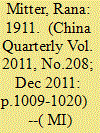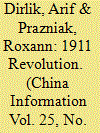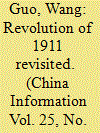|
|
|
Sort Order |
|
|
|
Items / Page
|
|
|
|
|
|
|
| Srl | Item |
| 1 |
ID:
114582


|
|
|
|
|
| Publication |
2011.
|
| Summary/Abstract |
One hundred years after the 1911 Revolution (Xinhai Revolution) in China, its meaning continues to be highly contested. Paradoxically, the more time that passes, the less certain either political actors or scholars seem to be about the significance of 1911 for the path of Chinese revolutionary history. This essay examines three phenomena: the appropriation of 1911 in contemporary political and popular culture; the use of 1911 as a metaphor for contemporary politics by PRC historians; and the changing meaning of 1911 over the past ten decades, particularly during the years of the war against Japan. The essay concludes that it is precisely the "unanchored" nature of 1911, separated from any one path of historical interpretation, that has kept its meaning simultaneously uncertain and potent.
|
|
|
|
|
|
|
|
|
|
|
|
|
|
|
|
| 2 |
ID:
110142


|
|
|
|
|
| Publication |
2011.
|
| Summary/Abstract |
The 1911 Revolution was a momentous event in bringing down the monarchical institution with a history of 2,000 years. Yet its consequences were ambiguous, it was overshadowed by the more radical revolution that followed in 1949, and it was stigmatized by the defeat of the Kuomintang, which claimed it as its own. Its 'revolutionariness' has been in question even as it has been celebrated as a turning point in modern Chinese history. This discussion reaffirms the revolutionary significance of the event, but also suggests that it is best viewed as a 'high peak' in a revolution of long duration that is yet to be completed. The current regime in China has revived aspects of monarchical culture and practices that revolutionaries sought to abolish in 1911. Most importantly, the promise of full citizenship for all that animated the 1911 Revolution remains unfulfilled, which may explain the contemporary regime's nervousness over the celebration of its 100th anniversary.
|
|
|
|
|
|
|
|
|
|
|
|
|
|
|
|
| 3 |
ID:
110145


|
|
|
|
|
| Publication |
2011.
|
| Summary/Abstract |
Both within and beyond China, contemporary reflections on the end of two millennia of imperial rule in China frequently focus upon the failure of the new republic to form a strong state and an effective parliamentary form of representative government. For many the agenda for political change in China today is traced back to unfulfilled opportunities in the past. This presentation suggests another set of perspectives that asks what political challenges were met in order to create a state ruling almost all the territory of the former empire, a transition unusual if not unique in the world history of empires, and how the manner in which those challenges were met influences the kinds of problems and possibilities China faces a century after the end of the last dynasty.
|
|
|
|
|
|
|
|
|
|
|
|
|
|
|
|
| 4 |
ID:
179283


|
|
|
|
|
| Summary/Abstract |
Situated far from coastal cities and foreign concessions, Chengdu yields insights into the role of the local press and its specific publics in the political evolution of the late Qing and early Republic. Despite its remote location, Chengdu developed its own modern press in the late Qing, relying on print entrepreneurs and modern journalists recruited from the ranks of the local literati and traditional sociability, in particular teahouses. They all played a role in forming a modern reading public which came to understand itself as a distinct local political community in dynamic interaction with national politics and transnational networks. The local press evinced three successive but intertwined ideals of publicness: as a link between the state and the people and a vector of enlightenment, as a professional forum for public opinion and as a tool for political mobilization. In solidifying public opinion around the local community, the press served as a forum and catalyst for political activism in the 1911 Railroad Protection movement and the 1919 May Fourth movement, events which were shaped as much by local dynamics as they were by national developments.
|
|
|
|
|
|
|
|
|
|
|
|
|
|
|
|
| 5 |
ID:
110144


|
|
|
|
|
| Publication |
2011.
|
| Summary/Abstract |
Reviewing the last decade of Chinese-language scholarship on the 1911 Revolution, this article suggests that we should view the Revolution in richer ways, rather than simply focusing on the political event on 10 October 1911. By contextualizing the revolution in its world, this article argues that it is necessary to view 1911 in its own terms and in global perspective in order to articulate historical continuities and discontinuities beyond 1911. How did, does, and will the spirit of modern revolution function and reshape the mental landscape in China's past, present, and future? The revolution is considered here to be not only a transhistorical source of transformation but also part of the restructuring of social life and ideals. Revolution has become the ontological ground of China's modern society. The meaning of the spirit of revolution lay in providing the Chinese people with a space of hope, where they could transcend current disappointment and discontent, and pursue political, economic, and cultural visions to fundamentally change their world. For individuals, revolution offered a means of meeting personal needs; for the nation, the revolution has meant the unending pursuit of 'standing up, enriching up, and strengthening up'.
|
|
|
|
|
|
|
|
|
|
|
|
|
|
|
|
| 6 |
ID:
127644


|
|
|
|
|
| Publication |
2014.
|
| Summary/Abstract |
This article turns three different analytical mirrors onto the Xinhai Revolution - 1911, 1961, 2011 - in order to interrogate its evolving significance in the minds of China's Han ethnic and ruling elite. In particular, it seeks to demonstrates the discursive appropriation of the Qing nomadic frontier in the ways in which the 1911 Revolution is remembered and commemorated, exploring both the temporal and spatial dimensions of this appropriation, and how the revolution shifted from a bloody Han racial insurrection against Manchu power and privilege to a heroic celebration of the revival of a multiethnic Chinese nation-state in the face of foreign imperialism and oppression.
|
|
|
|
|
|
|
|
|
|
|
|
|
|
|
|
|
|
|
|
|